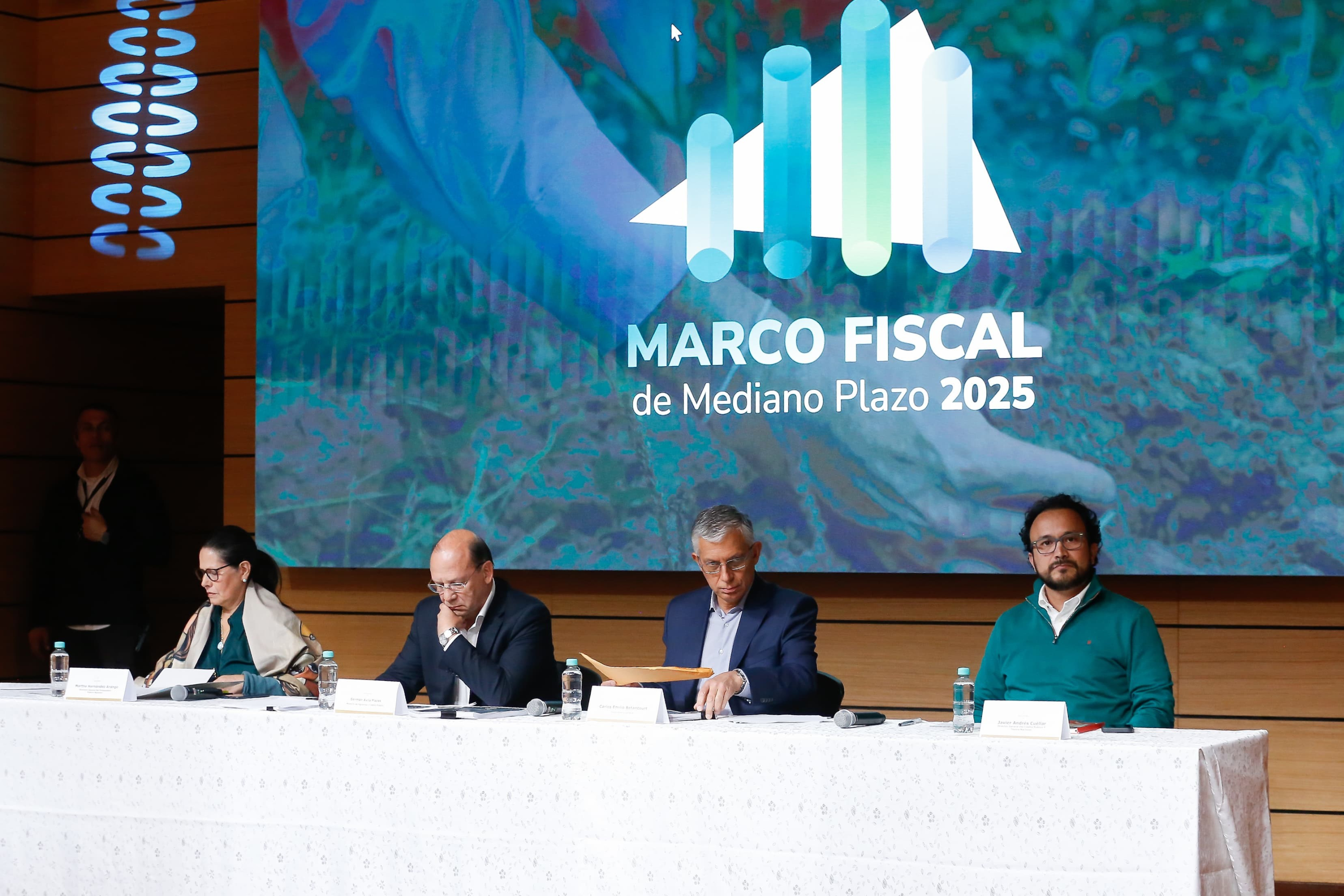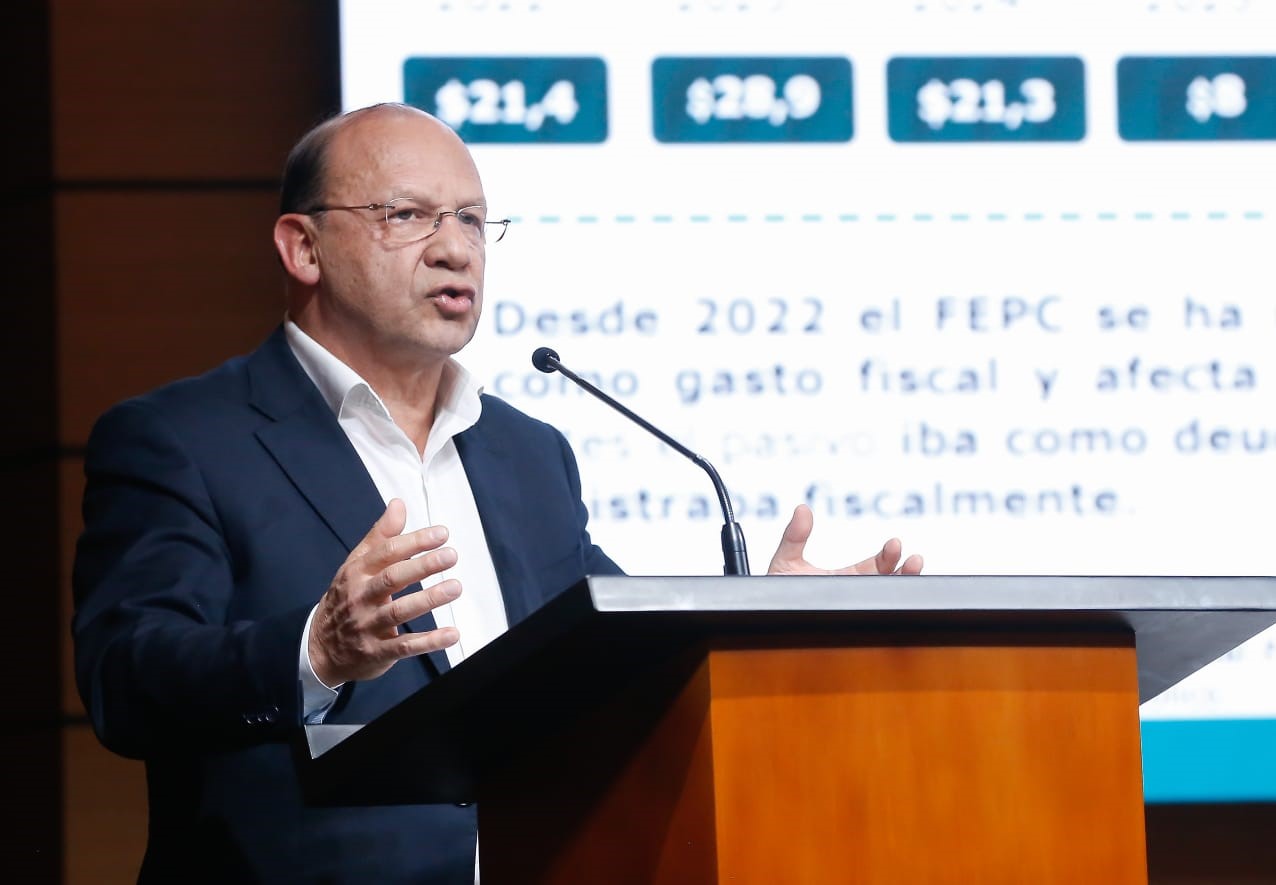These are the experts' warnings about the suspension of the fiscal rule and the new tax reform.

The critical state of Colombia's finances led Finance Minister Germán Ávila to abandon his own legally mandated commitment to not overspend to ensure fiscal sustainability and to announce a new tax reform to raise a minimum of 19 trillion pesos for next year.
After several days of rumors, Ávila confirmed at the presentation of the 2025 Medium-Term Fiscal Framework, held on June 13, that he will ignore the fiscal rule, which acts as a limit to the government's excessive debt year after year.

The Medium-Term Fiscal Framework 2025 was presented in Bogotá. Photo: Néstor Gómez EL TIEMPO
It will do so through an escape clause in the regulation itself, which allows it, for up to three terms, to fail to meet fiscal targets without being penalized due to an extraordinary event or one that jeopardizes the country's economic stability, as occurred during the COVID-19 pandemic when it was activated.
"We recognize that there is a complex fiscal landscape and are establishing a path to recovery. This is a responsible and careful decision," the minister stated in a press conference.
However, analysts say that breaking the targets established in the fiscal rule law, which has been in place in Colombia since 2011, and thus freeing up the way to spend more, sends a worrying signal of uncertainty and would raise the cost of borrowing.
"By suspending it, without a real and extraordinary justification for doing so, we will lose credibility in macroeconomic and fiscal management. Consequently, there will be difficulties in accessing financing, higher debt interest costs , and less budgetary space for social investment," stated former Finance Minister José Manuel Restrepo.
Likewise, José Mauricio Salazar, director of the Fiscal Observatory at the Universidad Javeriana, explained that activating this clause puts the credit rating at risk, could increase financing costs through higher interest rates , and even threaten the continuity of key instruments such as the International Monetary Fund's (IMF) Flexible Credit Line.
"It will send a worrying signal of uncertainty and institutional weakness. With net debt already approaching 60 percent of gross domestic product (GDP) in 2024 and interest payments representing nearly 5 percent of GDP, the country will face a scenario of increased debt, less room for social spending, and growing pressure on public finances," he said.

The suspension of the Fiscal Rule could lead to an increase in the cost of public debt. Photo: iStock
Along the same lines, César Pabón, Director of Economic Research at Corficolombiana, asserted that the fiscal problem has not been resolved and will be passed on to the next administration. “The Fiscal Framework confirms a regrettable Colombian tradition: once the law is made, the trap is set. Instead of adjusting public finances to comply with the Rule, the government increases spending by 20 trillion pesos, activates an escape clause without much explanation, leaves the problem to the next administration , and closes with a call for a fiscal pact,” he concluded.
After predicting a few months ago that the fiscal deficit would close this year at 5.1 percent of GDP, the government projected on Friday that it would rise to 7.1 percent, the worst figure on record, not including the pandemic (7.8 percent). It would then reach 6.2 percent in 2026, 4.9 percent of GDP in 2027, and 3.1 percent in 2028.
Something similar is happening with government debt, which the Rule establishes as an adequate level of 55 percent of GDP and a dangerous limit of 71 percent. The government expects it to end this year at 61.3 percent of GDP, higher than the 59.3 percent in 2024. Furthermore, it is expected to continue rising to 63 percent of GDP in 2026 and to 63.8 percent in 2027.
“The central concern regarding the fiscal situation is that public debt will increase by 9.6 percentage points of GDP—equivalent to 173 trillion—in just three years , in the context of an economy that has not experienced any significant internal or external shocks during that period. The spending cuts, which are necessary and unavoidable, are being left to the next government, which will inherit fiscal accounts in critical condition and must implement an immediate fiscal adjustment plan,” said Luis Fernando Mejía, director of the Fedesarrollo think tank.

Finance Minister Germán Ávila explained the decision. Photo: Néstor Gómez, EL TIEMPO
Faced with this situation, Ávila announced a "structural" reform on both the revenue and expenditure sides to return the country to the path of meeting its goals in a "sustainable and credible" manner.
"A fiscal pact is needed to address the problem of revenue dynamics and inflexible spending. Just with the gap in the Fuel Price Stabilization Fund (FEPC), the expenditure on energy and gas subsidies, and the amortization of the IMF's Flexible Credit Line, we have a massive impact of 120 trillion," the minister stated.
In order to balance the books, he announced that at the end of July he will present a new tax reform that will collect a minimum of 19 billion and a maximum of 25.4 billion pesos . It should be remembered that at the end of 2022, the government of Gustavo Petro, headed by former Finance Minister José Antonio Ocampo, already approved a reform to collect 20 billion pesos, and since the time of former Minister Ricardo Bonilla, another reform for 12 billion had been unsuccessfully insisted upon.
"Since the reform will almost certainly not be approved by Congress and no genuine intention to reduce the feverish increase in bureaucratic spending we are currently experiencing has been announced, this means there will be no way to defuse the exploding fiscal bomb," warned former minister Juan Camilo Restrepo.
Likewise, the president of the Colombian-American Chamber of Commerce (AmCham Colombia), María Claudia Lacouture, stated that Colombia does not need more taxes or contradictory rhetoric at this time. “The current situation should lead the government to give clear signals of responsibility in its fiscal decisions and consistency in its economic discourse. This is the minimum to generate confidence, attract investment, and protect jobs,” she said.
The new reform will seek to revise proposals inspired by the tax reform that was being considered last year, such as modifications to the carbon tax, VAT on online games of chance, or requiring both digital platforms and churches to pay taxes . A special tax on coal and oil would also be reviewed and tax relief proposed.

The government will continue with a 19 percent VAT on online games of chance. Photo: iStock
Additionally, new tax schemes could also be considered for activities or products that generate negative externalities, such as pesticide use, noise emissions, and devices like vaping. In total, with these measures, the government plans to raise between 4 and 8 billion pesos this year.
The second part of the reform, described by the minister as "structural," would seek 19 billion. Here, the government is proposing to review the VAT structure to reduce tax expenditures, which consist of deductions, exemptions, and special treatment granted to some taxpayers to stimulate growth.
Within VAT, the largest losses are in goods and services that are excluded, followed by those that are exempt and those with differential rates. "We are going to carefully review tax expenditures. There are approximately 89 billion pesos in VAT exemptions," explained Deputy Minister of Finance Carlos Emilio Betancourt.
For José Ignacio López, president of the economic research center Anif, the most important issue is political feasibility, as it is unlikely that a tax reform of this magnitude will be approved in the second half of the year. He also noted that there are contradictory messages, as the government had indicated that reducing VAT exemptions would not be on the table. "This is an unviable solution, and fiscal adjustment will depend on what a future government can do ," he opined.
Likewise, the reform would seek to change the consumption tax and make additional modifications to the personal income tax. According to his proposal, the possibility of strengthening its progressivity could be explored by revising the rates applicable to the highest income brackets. "In terms of income, we believe there is still room for one or two marginal rates to increase the tax's progressivity," the deputy minister stated.
Overall, the government projects that its total revenue will reach 18.2 percent of GDP by 2026, representing a 1.1 percentage point increase compared to 2025, primarily due to increased revenue from this tax.

Presentation of the Medium-Term Fiscal Framework 2025 Photo:
In parallel, the government proposed the creation of a Mission to reform public spending and correct the factors that generate inefficiency and inflexibility. This should lead to the formulation of a bill and would address issues such as greater efficiency in targeting subsidies, the review of exemptions on contributions to health, SENA, and ICBF so that employers, rather than the nation, bear this cost, as well as the possible redirection of funds from compensation funds to the health sector.
It should also consider the definitive elimination of the implicit subsidy provided by the FEPC for diesel consumption and the generation of institutional efficiencies through the rationalization of redundant functions and structures.
For now, the government expects total spending to reach 24.4 percent of GDP in 2026, an increase of 0.2 percentage points compared to 2025. This is due to the inflexible components of public spending, such as the General Participation System and the increase in transfers to the health and pension sectors.
Committee that oversees the rule, in disagreement Even the Autonomous Committee of the Fiscal Rule (CARF) announced that it had issued a preliminary opinion unfavorable to the activation of the clause and that the adjustment plan proposed by the government is not sufficient to bolster confidence or stabilize the debt at a prudent level.
"The critical situation of public finances highlights the urgent need for all sectors, including the government, Congress, and society (regional entities, social organizations, businesses, and those benefiting from spending and tax exemptions) to agree on the necessary measures to stabilize finances within a reasonable timeframe," he stated.
eltiempo





